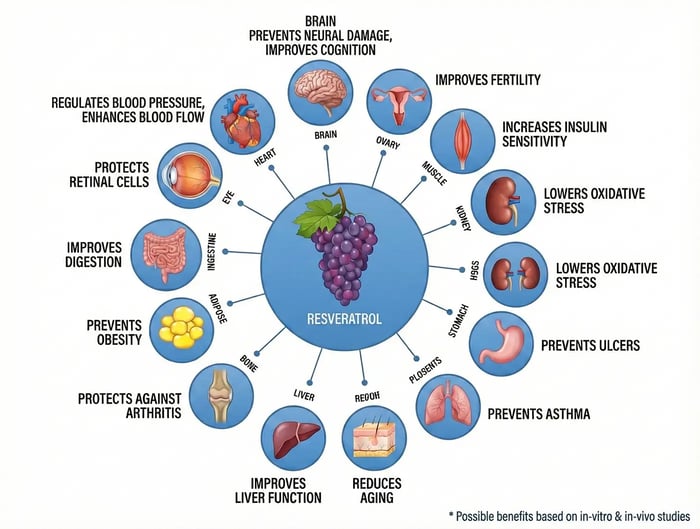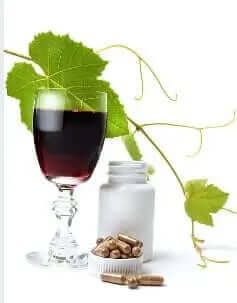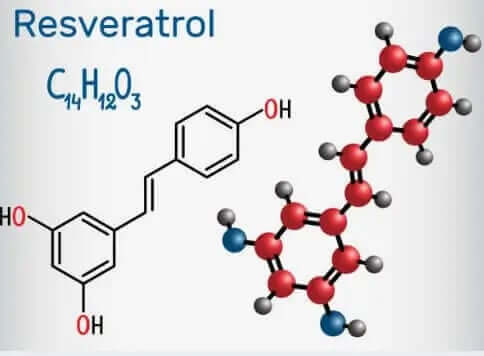The Complete Guide to Effectivity of Resveratrol: Benefits, Uses, and Scientific Evidence
Discovering the effectivity of resveratrol has opened new possibilities for natural health solutions. This comprehensive guide explores how resveratrol works, its proven benefits, and what science tells us about this powerful compound found in red wine, grapes, and certain berries. Whether you're seeking natural allergy relief, weight management support, or overall wellness enhancement, understanding resveratrol's effectiveness can transform your approach to health.

Understanding the Effectivity of Resveratrol: What Makes It Special
Resveratrol stands out among natural compounds for its unique ability to support multiple aspects of health. This polyphenol, primarily found in grape skins, Japanese knotweed, and peanuts, has captured scientific attention for its potential to promote longevity and wellness. The effectivity of resveratrol stems from its powerful antioxidant properties and its ability to activate certain proteins associated with healthy aging.
Research reveals that resveratrol works at the cellular level, influencing gene expression and supporting your body's natural defense systems. This remarkable compound mimics the effects of caloric restriction, potentially unlocking benefits that were once thought achievable only through strict dietary measures.
Proven Benefits: Where Resveratrol Shows Greatest Promise
Seasonal Allergy Relief That Actually Works
One of the most exciting discoveries about the effectivity of resveratrol involves its potential for managing hay fever symptoms. Clinical studies demonstrate that using a resveratrol nasal spray three times daily for four weeks can significantly reduce allergy symptoms in adults. Even more encouraging, children with seasonal allergies experienced relief when using a combination spray containing beta-glucans and resveratrol for two months.
This breakthrough offers hope to millions suffering from seasonal allergies, providing a natural alternative that works with your body's immune system rather than simply masking symptoms. The anti-inflammatory properties of resveratrol help calm the overactive immune response that causes those frustrating allergy symptoms.
Weight Management Support Through Natural Mechanisms
The effectivity of resveratrol for weight management has shown promising results in multiple studies. When high-quality resveratrol supplements are taken orally, they appear to enhance weight loss efforts in overweight and obese adults. This natural compound works by:
- Enhancing metabolic function
- Supporting healthy fat oxidation
- Promoting energy production at the cellular level
- Helping regulate appetite signals
- Supporting healthy insulin sensitivity
While resveratrol shows promise for weight management, it's important to note that it works best as part of a comprehensive approach including healthy eating and regular physical activity.
Understanding Limitations: Where Resveratrol May Not Meet Expectations
Transparency about the effectivity of resveratrol means acknowledging areas where research hasn't shown clear benefits. Understanding these limitations helps you make informed decisions about supplementation.
Heart Disease Prevention: Mixed Results
While people consuming higher amounts of dietary resveratrol show lower heart disease risk, oral supplements haven't consistently demonstrated the same cardiovascular benefits. Studies indicate that resveratrol supplements don't significantly impact cholesterol levels or triglycerides in people at risk for heart disease.
Metabolic Syndrome Management
Despite initial hopes, research shows that oral resveratrol doesn't significantly affect blood pressure, glucose levels, or cholesterol in people with metabolic syndrome. This finding highlights the importance of comprehensive lifestyle changes rather than relying solely on supplements.
Non-Alcoholic Fatty Liver Disease (NAFLD)
Current evidence suggests that resveratrol supplementation doesn't improve liver function, reduce scarring, or improve cholesterol levels in NAFLD patients. This underscores the need for continued research and multi-faceted treatment approaches.
Safety Profile: What You Need to Know About Resveratrol Side Effects
Understanding the safety aspects of resveratrol helps ensure you can experience its benefits while minimizing risks. The good news? Resveratrol has an excellent safety profile when used appropriately.
General Safety Guidelines
Most people safely consume resveratrol through dietary sources daily. When it comes to resveratrol supplements, research supports these safety parameters:
- Standard doses (250-1500 mg daily): Safe for up to 6 months
- Higher doses (2000-3000 mg daily): Generally safe for 2-6 months, though stomach discomfort may occur
- Topical application: Safe for skin use up to 30 days
- Nasal spray: Safe for at least 4 weeks of use
Special Populations and Precautions
Certain groups should exercise extra caution when considering resveratrol supplementation:
Pregnancy and Breastfeeding
While dietary resveratrol from food sources is safe, pregnant and breastfeeding women should avoid supplements. The source matters significantly – obtaining resveratrol from wine during pregnancy or breastfeeding is never recommended.
Children
Children can safely consume resveratrol through food sources. Nasal sprays containing resveratrol appear safe for pediatric use up to two months, but oral supplements lack sufficient safety data for children.
Medical Conditions Requiring Caution
- Bleeding disorders: Resveratrol may affect blood clotting
- Hormone-sensitive conditions: Due to potential estrogen-like effects
- Scheduled surgery: Discontinue use 2 weeks before procedures
Optimal Dosing Strategies for Maximum Effectivity of Resveratrol
Finding the right dose is crucial for experiencing the full effectivity of resveratrol. Research provides clear guidance on optimal dosing strategies:
Standard Adult Dosing
The most commonly studied and recommended doses for adults range from 250 mg to 1000 mg daily, taken orally for up to 3 months. This range balances effectiveness with safety, minimizing the risk of side effects while providing therapeutic benefits.
Factors Affecting Dosage Decisions
- Individual health goals
- Body weight and metabolism
- Existing health conditions
- Other medications or supplements
- Bioavailability of the specific formulation
Maximizing Resveratrol Absorption and Effectiveness
The effectivity of resveratrol depends significantly on how well your body absorbs and utilizes it. Here are proven strategies to enhance bioavailability:
Timing and Food Interactions
- Take with a small amount of healthy fat to improve absorption
- Morning dosing may align better with natural circadian rhythms
- Avoid taking with high-calcium foods that may interfere with absorption
Choosing Quality Supplements
Not all resveratrol supplements are created equal. Look for:
- Trans-resveratrol (the active form)
- Third-party testing for purity
- Micronized formulations for better absorption
- Protected packaging to prevent degradation
Real-World Applications: Success Stories and Practical Tips
Understanding the effectivity of resveratrol becomes more meaningful through real-world applications. Many individuals have successfully incorporated resveratrol into their wellness routines with impressive results.
Allergy Season Strategy
Start resveratrol nasal spray use 2-3 weeks before your typical allergy season begins. This proactive approach allows the compound to build up in your system and provides better symptom control when allergens peak.
Weight Management Protocol
Combine resveratrol supplementation with:
- Mediterranean-style eating patterns
- Regular physical activity (aim for 150 minutes weekly)
- Stress management techniques
- Adequate sleep (7-9 hours nightly)
The Science Behind Resveratrol: Understanding Mechanisms of Action
The remarkable effectivity of resveratrol stems from its unique molecular actions:
Sirtuin Activation
Resveratrol activates sirtuins, particularly SIRT1, which are proteins involved in cellular health and longevity. This activation triggers beneficial changes in gene expression, metabolism, and stress resistance.
Antioxidant Properties
As a potent antioxidant, resveratrol neutralizes harmful free radicals that can damage cells and accelerate aging. This protective effect extends throughout the body, supporting overall health and vitality.
Anti-Inflammatory Actions
By modulating inflammatory pathways, resveratrol helps maintain healthy inflammatory responses, which is crucial for preventing chronic diseases and supporting optimal wellness.
Future Perspectives: Emerging Research on Resveratrol Effectivity
Exciting new research continues to unveil additional benefits and applications for resveratrol:
- Cognitive health and neuroprotection
- Skin health and anti-aging applications
- Exercise performance enhancement
- Gut microbiome support
- Cellular senescence prevention
These emerging areas of research suggest that we're only beginning to understand the full potential of this remarkable compound.
Making Informed Decisions About Resveratrol Supplementation
The effectivity of resveratrol varies based on individual factors and specific health goals. Consider these steps when deciding if resveratrol is right for you:
- Assess your specific health needs and goals
- Review the scientific evidence for your particular concerns
- Consult with healthcare providers, especially if you have existing conditions
- Start with lower doses and monitor your response
- Choose high-quality supplements from reputable sources
- Track your progress and adjust as needed
Frequently Asked Questions About Effectivity of Resveratrol
How long does it take to see results from resveratrol supplementation?
The timeline for experiencing the effectivity of resveratrol varies by application. For seasonal allergies, improvements often appear within 2-4 weeks of consistent use. Weight management benefits typically emerge after 8-12 weeks of supplementation combined with lifestyle changes. Some people report increased energy and well-being within the first few weeks, while other benefits may take several months to manifest fully.
Can I get enough resveratrol from food sources alone?
While dietary sources provide some resveratrol, achieving therapeutic doses through food alone is challenging. For example, you'd need to drink hundreds of glasses of red wine to match the resveratrol in a typical supplement. Foods highest in resveratrol include red grapes, blueberries, cranberries, and peanuts. Most people seeking specific health benefits choose supplements to ensure consistent, therapeutic doses.
What's the difference between resveratrol and trans-resveratrol?
Trans-resveratrol is the biologically active form that provides health benefits, while cis-resveratrol is less stable and less effective. Quality supplements specify trans-resveratrol content, ensuring you receive the form proven effective in research studies. The effectivity of resveratrol depends largely on getting the trans form, which is why checking supplement labels is crucial.
Are there any medications that interact with resveratrol?
Resveratrol may interact with blood thinners, NSAIDs, and medications metabolized by certain liver enzymes. Its mild blood-thinning effects could enhance anticoagulant medications. Always consult healthcare providers before combining resveratrol with prescription medications, especially if you take multiple medications or have chronic health conditions.
What time of day should I take resveratrol for best results?
Research suggests taking resveratrol in the morning may align better with natural circadian rhythms and cellular repair processes. Some people prefer taking it with breakfast to minimize any potential stomach discomfort. The effectivity of resveratrol doesn't seem significantly affected by timing, so choose a schedule you can maintain consistently.
Can resveratrol help with skin health and aging?
Emerging research shows promising results for resveratrol in supporting skin health. Its antioxidant properties help protect against environmental damage, while its anti-inflammatory effects may reduce signs of aging. Both oral supplements and topical applications show potential benefits, though more research is needed to fully understand optimal protocols for skin health.
Is resveratrol safe for long-term use?
Current research supports the safety of resveratrol for periods up to 6 months at standard doses. While no significant safety concerns have emerged for longer-term use, most studies haven't extended beyond this timeframe. Many people successfully use resveratrol long-term by cycling on and off or maintaining lower maintenance doses after initial therapeutic periods.
How can I tell if resveratrol is working for me?
Tracking the effectivity of resveratrol requires attention to specific markers related to your health goals. For allergies, monitor symptom frequency and severity. For weight management, track not just weight but also energy levels, appetite control, and body composition. Keep a health journal noting changes in sleep quality, mood, and overall vitality. Some benefits occur at the cellular level and may not be immediately noticeable but contribute to long-term health.
What should I look for when choosing a resveratrol supplement?
Quality indicators include: trans-resveratrol content clearly stated, third-party testing certificates, micronized or enhanced absorption formulas, dark or opaque packaging to prevent light degradation, manufacturing in GMP-certified facilities, and clear expiration dates. The effectivity of resveratrol depends significantly on product quality, making these factors crucial for success.
Can resveratrol replace other health interventions?
While resveratrol offers impressive benefits, it works best as part of a comprehensive wellness approach. Think of it as a powerful tool that enhances, rather than replaces, fundamental health practices like nutritious eating, regular exercise, stress management, and adequate sleep. The greatest effectivity of resveratrol emerges when combined with these foundational health habits.
Conclusion: Embracing the Promise of Resveratrol
The growing body of evidence supporting the effectivity of resveratrol offers hope for those seeking natural health solutions. From providing relief during allergy season to supporting healthy weight management, resveratrol demonstrates real potential for improving quality of life. While it's not a miracle cure for all conditions, its proven benefits in specific areas make it a valuable addition to many wellness routines.
Success with resveratrol comes from understanding both its strengths and limitations, choosing quality products, and using it as part of a holistic approach to health. As research continues to unveil new applications and benefits, resveratrol stands as a testament to nature's pharmacy and the exciting possibilities that await those willing to explore evidence-based natural health solutions.
Your journey with resveratrol begins with knowledge and continues with mindful application. Whether you're seeking allergy relief, weight management support, or general wellness enhancement, understanding the effectivity of resveratrol empowers you to make informed decisions that align with your health goals and aspirations for a vibrant, healthy life.
Scientific References
- Resveratrol nasal spray efficacy in seasonal allergic rhinitis
- Effects of resveratrol supplementation on weight loss: A systematic review
- Resveratrol and cardiovascular health: Current evidence
- Safety profile of resveratrol supplementation
- Resveratrol use during pregnancy: A comprehensive review
- Resveratrol in skin health and regeneration






